As the Olympic decathlon draws to a conclusion in Paris on Saturday 3rd August, four thousand miles away in Geneva, Ohio another decathlon championships has begun – an inaugural World Championships for decathlon for women, presented by women’s sports apparel brand, Oiselle.
The Olympic decathlon has been a core element of sporting infrastructure for over a century. This weekend in Ohio, the decathlon taking place will be one of a series of stakes in the ground to build a parallel infrastructure – one which corrects the historical oversight that has excluded women from participation in decathlon.
The world championships, presented by Oiselle, are a natural progression from the national championships in France in 2024, and the national championships in the USA in 2023. The competition also creates an international focal point to continue to develop the discipline, and to bring together the clusters of women around the world who want to participate in decathlon.
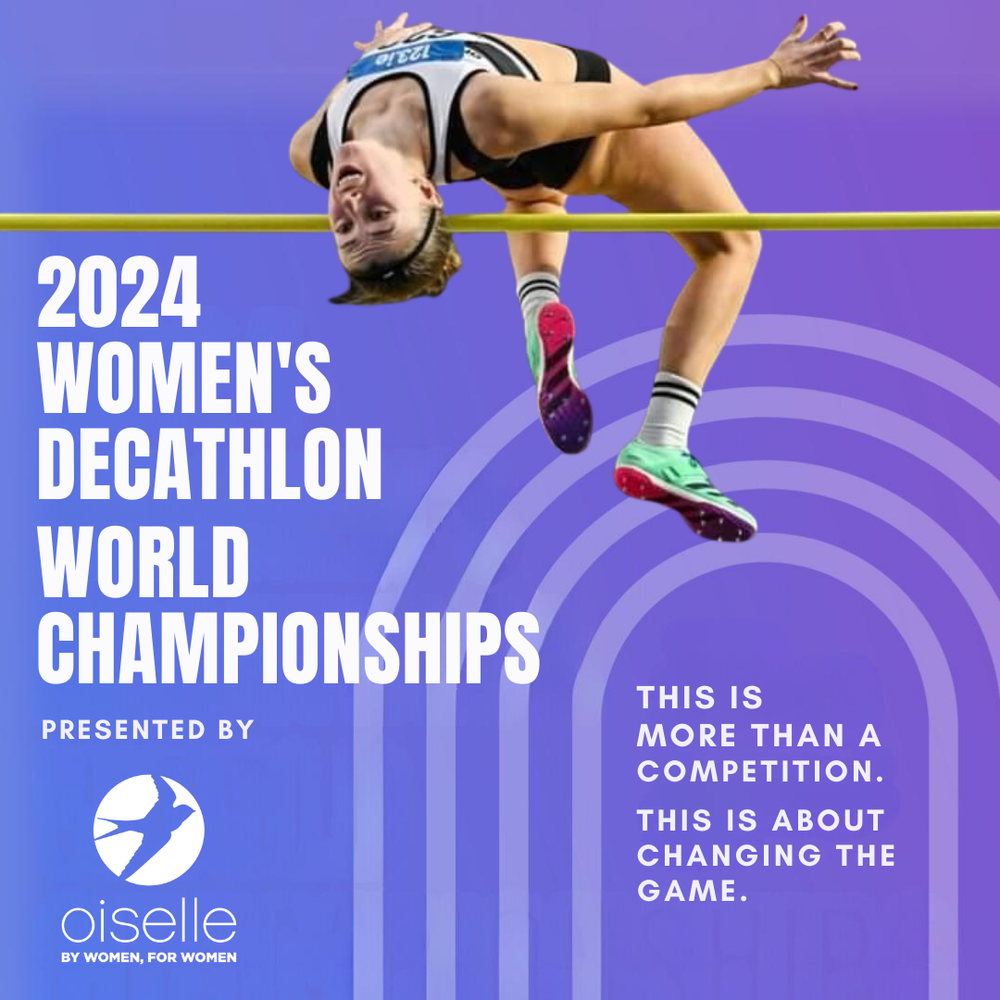
The work which has led to this point has been in train for a long time. A structure started to crystallise a few years ago with regular competitions in the USA and in France, and ad hoc competitions in Switzerland, Belgium, Germany and elsewhere.
Bespoke competitions designed for aspiring junior and senior decathletes – not places begged or borrowed from men’s decathlons, or spots reliant on the inclusive kindness of masters’ competitions. And opportunities where all the decathlon events are in the correct order, same as the men – not the problematic format approved by the IAAF in 2001 to reverse women’s decathlon field events because “problems would appear when these two events should be organised at the same time.”
US NATIONALS
In August 2023, the US nationals were held at Mt SAC and incorporated into the national masters combined events championships. That crowned Katie Straus as US champion in her first decathlon, followed by Jordyn Bruce and Haley Rizek. A few weeks earlier Bruce had, with American record-holder Jordan Gray, participated in the Open de France decathlon.
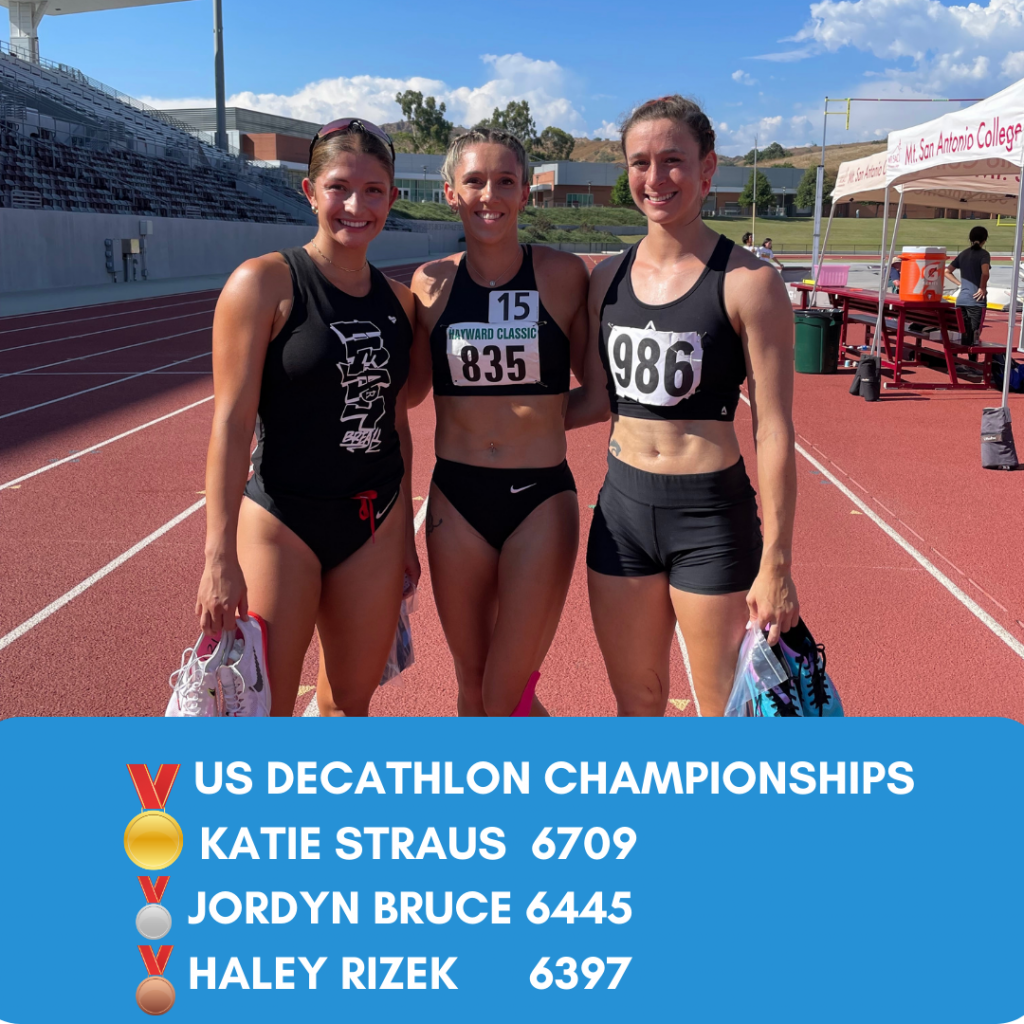
COMBINED EVENTS TOUR
In January 2024, Jordyn returned to France, this time to Clermont Ferrand for the annual X-Athletics competition, part of the World Athletics Combined Events Tour.
The meet was a feeder competition for qualification for the World Indoor Championships in Glasgow, with generous rankings points to count towards championships later in the year. It is always one of the highlights of the indoor season, with big names from combined events on the starting list.
For the first time, a women’s heptathlon was held alongside the men’s equivalent and the women’s pentathlon. The additional heptathlon blended seamlessly into the other activity, normalising the parity of competition. Identical male and female competitions taking place in parallel, providing a richer Saturday schedule, disciplines gently staggered throughout the day.
There were, of course, rude reminders of the glacial pace at which World Athletics are bringing their antediluvian decathlon rules into line with their otherwise excellent gender equity programme. The absence of comprehensive indoor tables for women created additional on-site administrative challenges and some tricky decisions.
But otherwise, the heptathlon in Clermont Ferrand was a glimpse into a future.
A future where women have the same range of competition opportunities as men, without being subjected to endless, exhausting demands to justify themselves. Without being interrogated to personally solve all potential problems before being permitted to progress – conditions never applied to the ambitions of men. A future where the “women’s” can be dropped when referring to decathlon, because the assumption that it is an event only for men will no longer be the norm.
On the track and on the field in Clermont Ferrand, Noemie Desailly of France took to the heptathlon like a duck to water. She and Bruce sparred over the seven events through the two days, leading the six-women US-France field – with Lauren Kuntz, Adeline Audigier, Roseva Bidois and Anaik Previdi – through an energetic, positive competition.
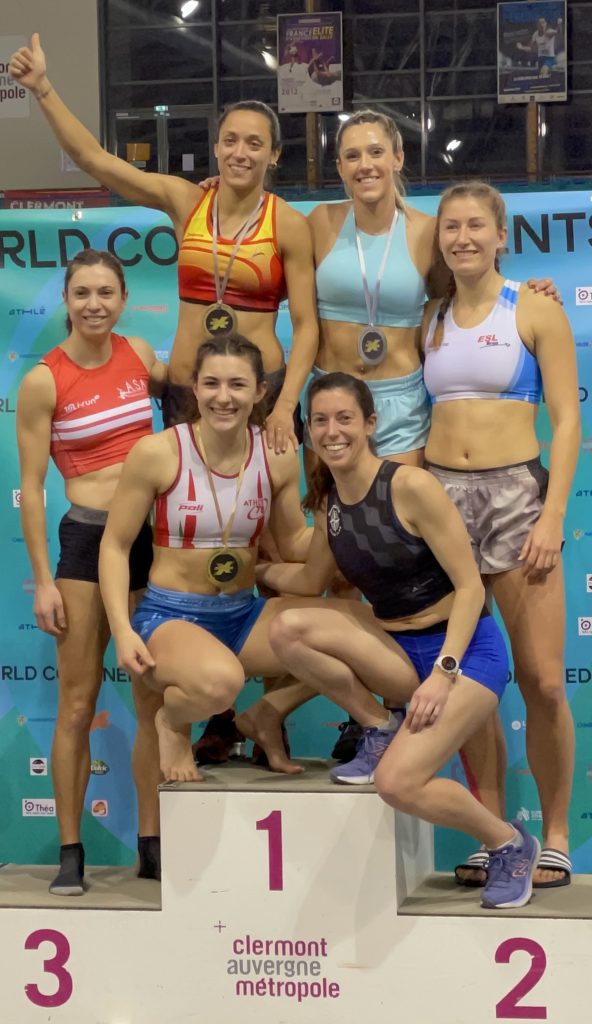
FRENCH NATIONALS
And that was only the start of the French decathlon activity in 2024. In 2023 the French Athletics Federation announced there would be an official national championships in decathlon for women this year, incorporated into their extensive regional nationals framework. There would be feeder decathlons too, all around France and in their overseas departments, such as Martinique, to qualify for the national title fight.
The championships took place in July 2024 in Talence – site of the annual Decastar competition – as part of a vibrant wider track and field competition. As in Clermont Ferrand, the presence of a decathlon in which women were competing felt deliciously unremarkable, so delightfully routine.
But of course, the occasion was celebrated, as national bests in decathlon were overtaken and reset, and other milestones passed. Noemie Desailly turned her indoor heptathlon victory into an inaugural national decathlon title, with 7705 points, second only in French history to Marie Collonville’s score of 8160 when establishing the very first women’s decathlon world record.
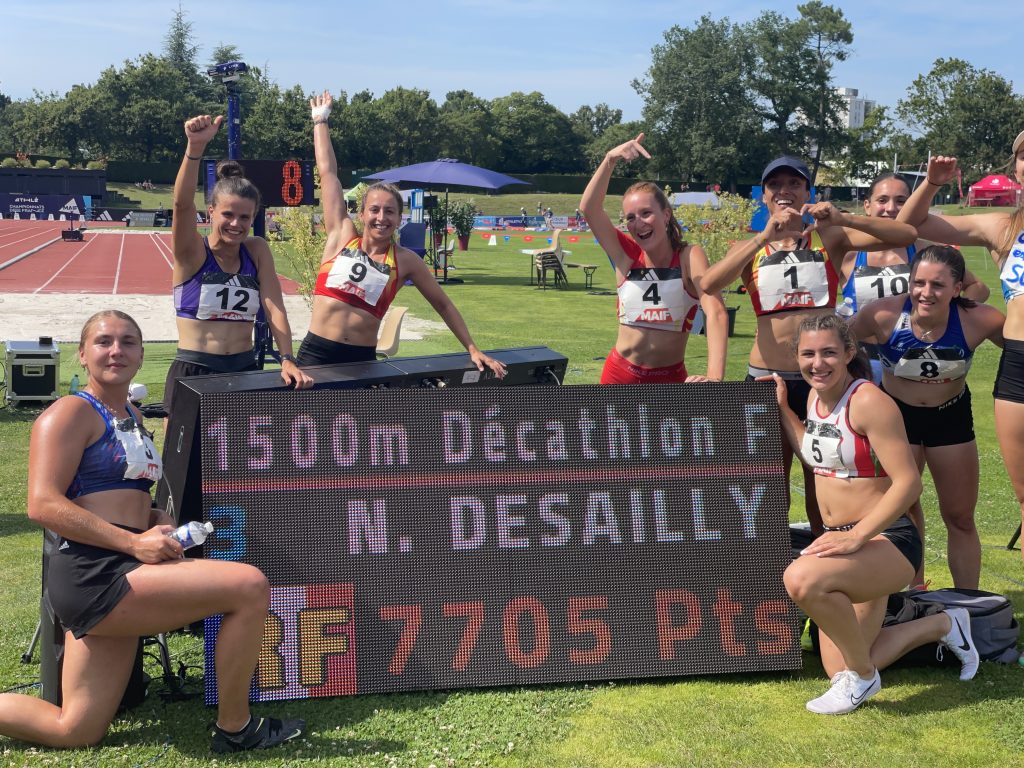
While Desailly stretched ahead of her competitors for the title, there was a battle between Emma Brentel and Roseva Bidois to take second and third, and a changing leaderboard over the weekend as athletes with different strengths and weaknesses ebbed and flowed in the competition. Exactly the way that a men’s decathlon would unfold.
Damian Warner excels on the track, Niklas Kaul in the throws, Maicel Uibo in the jumps. Likewise, Noemie Desailly’s sprints were her strength, Roseva Bidois her throws (including a 47m discus) and Emma Brentel her jumps (including a 4.21m pole vault). With the greatest of respect and love for the outdoor heptathlon, it does not have the scope to accommodate multiple diverse types of athletes, and instead constrains women to the narrower opportunity offered by seven events.
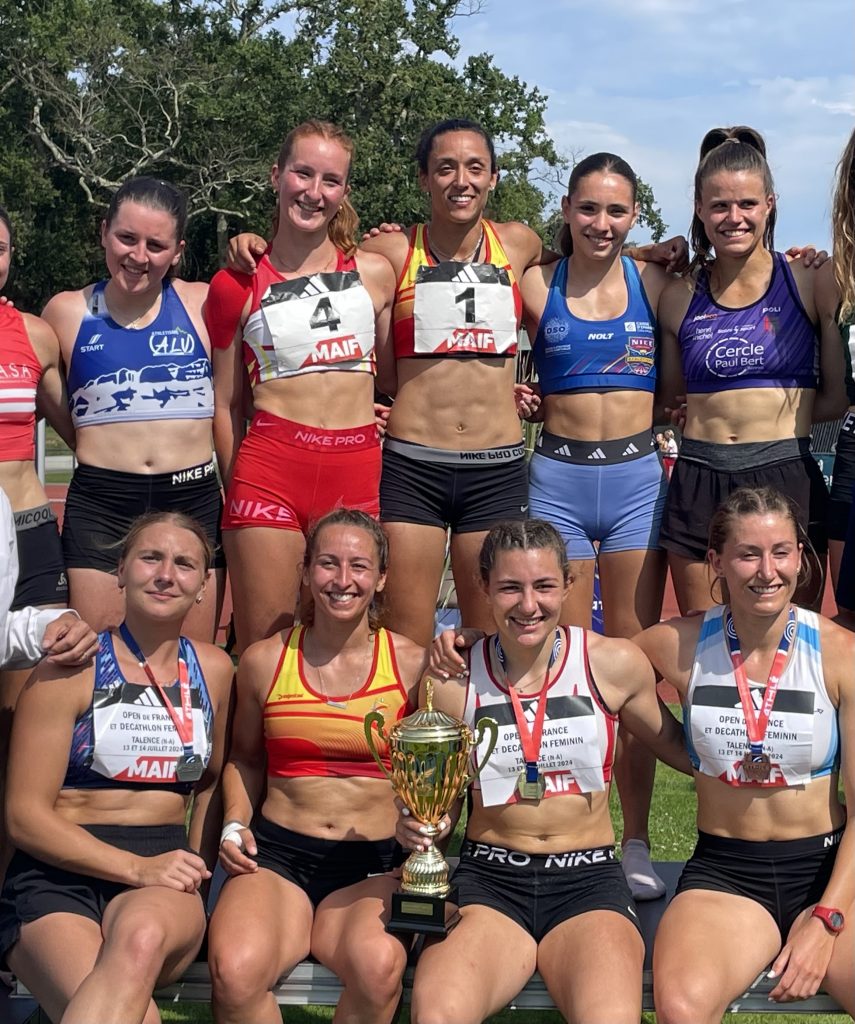
WORLD CHAMPIONSHIPS
And so this takes us back to Ohio, where the national hubs of decathlon activities come together to create an international, world championships for women. The championships has elite and development decathlon categories, alongside a double decathlon (icosathlon).
Lauren Kuntz, veteran of the US championships in 2023 and the Clermont Ferrand competition in January, is one of the driving forces behind women’s decathlon in the USA, alongside US record holder Jordan Gray (who is currently injured).
Lauren is competing in a double decathlon (icosathlon) this weekend. She was refused participation in the icosathlon at the World Icosathlon Championships in Belgium earlier this year, and told that as a woman, she was restricted to competing in the shorter 14-event tetradecathlon.
As a then potential world-record holder, Lauren offered to engage sponsors to assist with any additional practical requirements for extra implements/runs. But her request to be included in the field was ultimately denied because – wait for it – her participation in the icosathlon would invalidate the results of the male athletes. A rule from the same stable as the World Athletics guidance that declares women should do decathlon field events in reverse order, to avoid any suggestion that men’s interests might not be prioritised.
So, Lauren organised her own competition, broke the Icosathlon world record, and has now gone a step further to establish a World Championships for decathlon this weekend in Ohio.
In the elite decathlon field there is a start list of 19, originally due to be more before a few late withdrawals. The field has eight athletes from the USA, six from France, most of whom competed in the recent nationals or in Clermont Ferrand, and one from each of New Zealand, Spain, Ireland, Switzerland and Armenia.
The Armenian is, of course, Allison Halverson, a world class athlete in several other events and undertaking one last competition before retiral.
The developmental decathlon has a field of ten, including athletes from Great Britain, Australia, Puerto Rico, Switzerland and USA.
Elite field:
- USA: Laura Matthews, Jordyn Bruce, Emily Swanson, Brittany Bishop, Corinn Brewer, Amanda Pasko, Morgan Matthews, Michaela Wenning
- France: Patricia Mehlich, Roseva Bidois, Anissa Ben Taleb, Anaik Previdi, Lalie Carlier, Adeline Audigier
- New Zealand: Maria Sartin
- Spain Uxia Pereira
- Ireland: Lara O’Byrne
- Switzerland: Adriana Brugger
- Armenia: Allison Halverson
LEVELS OF OFFICIAL
Plans for the event received an additional boost when the French contingent revealed their Federation had agreed they could wear official French kit to the championships. A team of female decathletes wearing their national uniform en route to a world championships is a powerful image for aspiring young female decathletes, and for the sport more generally.
The French team’s presence inspired curiosity while travelling, as other passengers wondered whether they might be on their way to compete in the Olympic Games. And when the team explained why there was no event for them in Paris, and why they had to fly around the world to compete, the airline staff and captain wrote notes of encouragement and support.
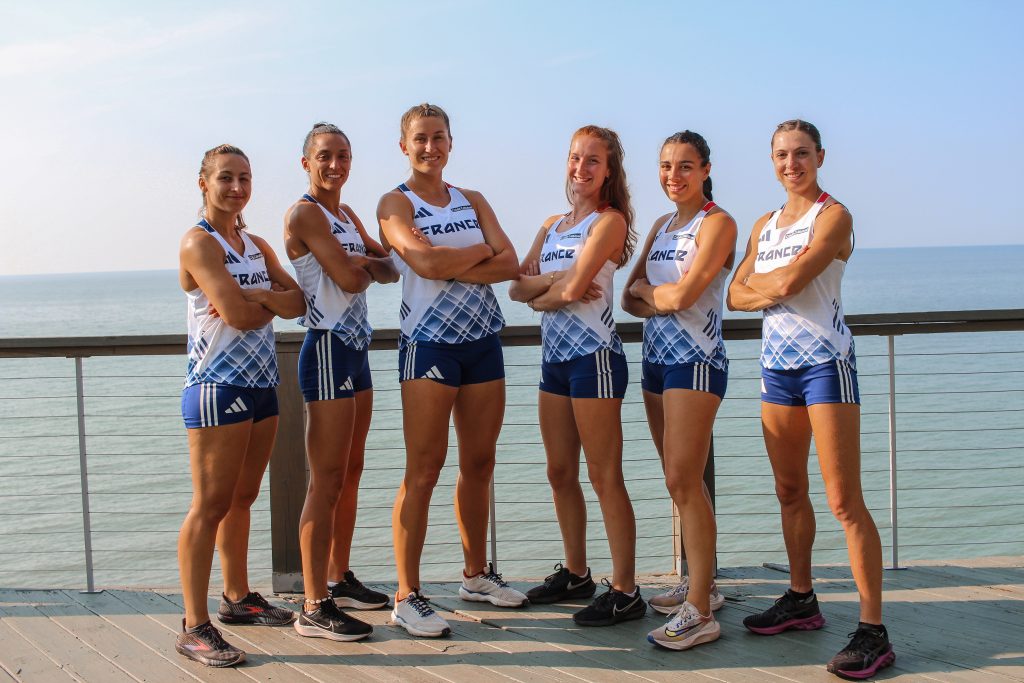
In France, the national Federation is fully supportive of the discipline, designating the national championships an official Federation event. That’s in no part due to France’s early pioneering efforts in women’s decathlon, and driving forward Marie Collonville’s legacy seems to be a priority.
In the USA, athletes don’t yet benefit from the sort of support provided to the French. USATF recognise the decathlon competitions as legitimate events, with official results, and enable the conditions to be in place for the events to be registered on the official WA calendar.
But neither USATF nor World Athletics recognise the decathlon as a fully-fledged “official” event for women on a par with other events.
#WEGROWATHLETICS…unless you’re a female decathlete
For example, World Athletics’ website does not include decathlon in the drop-down lists for women’s statistics, competitions etc. You can find such entries for the 55m hurdles and the 2000m steeplechase, though.
Decathlon results are captured on the WA website for both men and women, but only the men’s event can be searched or organised in a meaningful way. Likewise, this weekend’s championships is logged on the WA calendar, but cannot be found using the Combined Events filter.
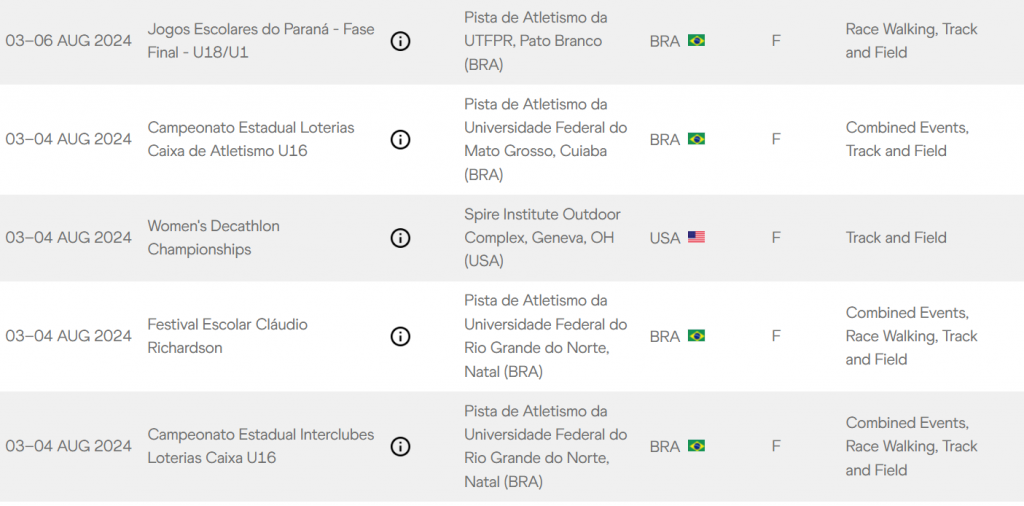
A woman inspired by the Olympic decathlon, and wishing to attend or try a decathlon for herself, would be unlikely to find this weekend’s women’s world decathlon championships on the WA website unless she knew it was there.
This anomaly must surely be on borrowed time. Together with the problematic language in the Combined Events scoring tables, it is an embarrassing disconnect from WA’s #WeGrowAthletics initiative which has been groundbreaking in upturning the traditional prioritisation given to male events in athletics. But at least our 55m hurdles needs are sorted.
For now, USATF are bystanders, rather than active participants in building structures for women’s decathlon.
SPONSORS AND MILESTONES
Perhaps most importantly, the current momentum on women’s sport has brought benefits to women’s decathlon. In addition to a number of local sponsors, and sponsors of previous events, the event will be supported by Oiselle, a major brand in women’s sports apparel. It’s unlikely to be too long before other sponsors come on board too, attracted by the ground-breaking activities of women who will in due course be known as the world’s greatest athletes.
A helpful byproduct of these championships, and of the meets in France and elsewhere, is an increasing portfolio of decathlon scores. Austra Skujyte’s world record is 8358, well out of reach of most athletes beginning their career in decathlon. Jordan Gray’s American record is also impressive at 8246.
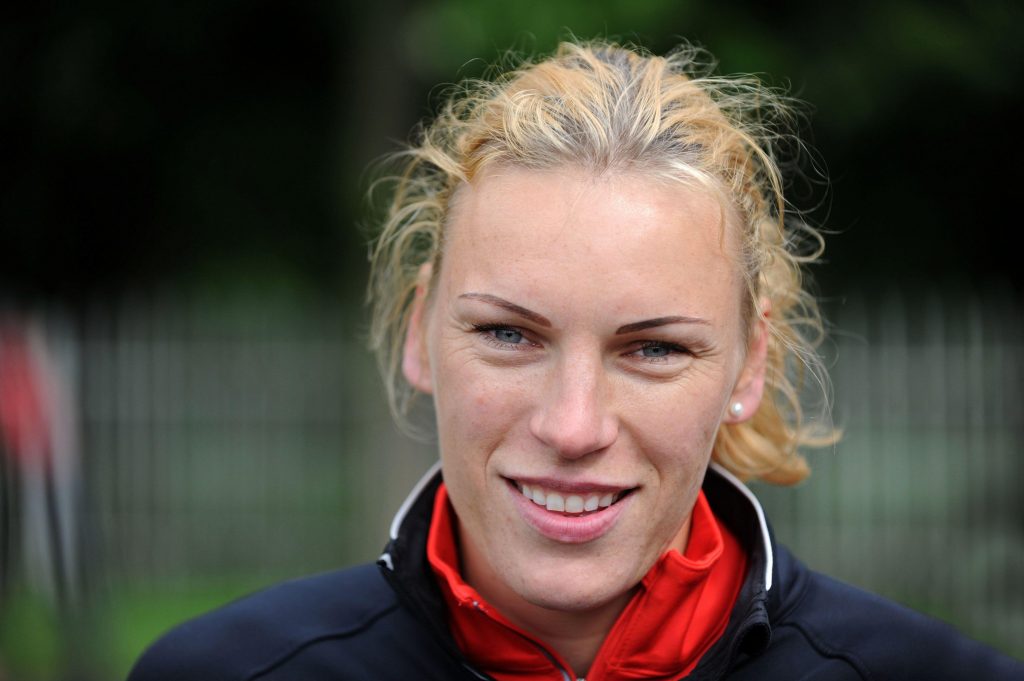
But now the gaps are filling. Noemie Desailly’s 7705 is the perfect stepping stone, in the same way that a male decathlete might expect to score 7700 in their career en route to 8000 and above. The medallists in the 2023 US national champs all scored in the high 6000s in some of their first decathlons. The French championships last month added another swathe of scores, on top of all the regional marks logged before that.
Suddenly, there is a pathway of stepping stones for girls to try out decathlon, test where they are across ten events, and plan a path for development, inspired by a range of role models with different strengths and weaknesses.
And one by one, the doors currently slammed shut on teenage girls, with the message that only boys are allowed, are beginning to crack open.
FOLLOWING THE EVENT
You can find all the information you need to follow the World Decathlon Championships for women, presented by Oiselle, here, and more general information about women’s decathlon here.
Words: Gabby Pieraccini


